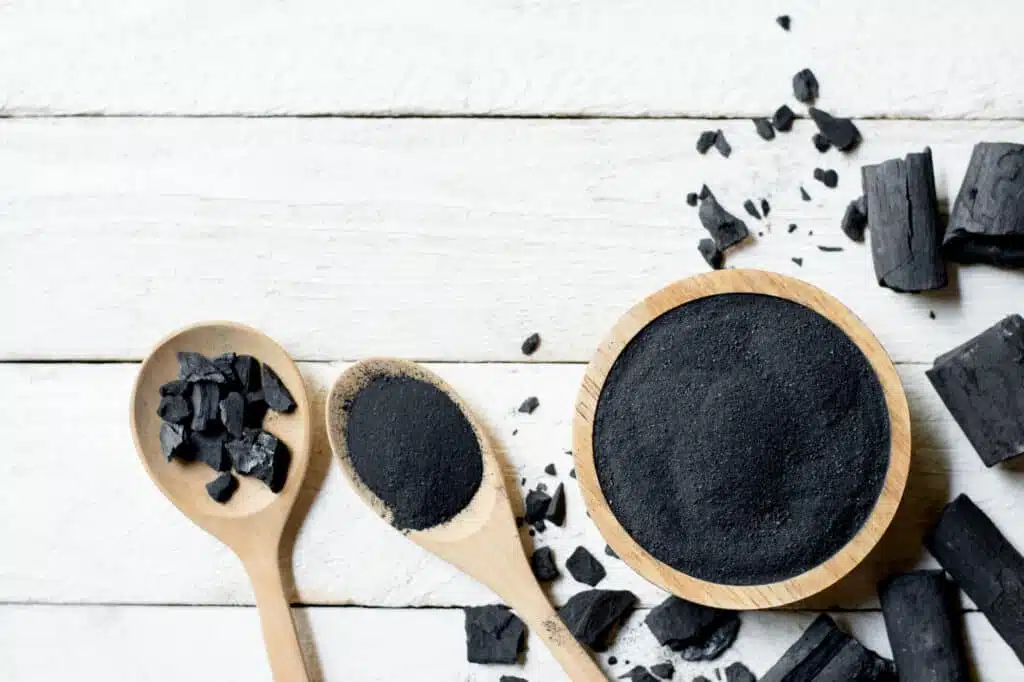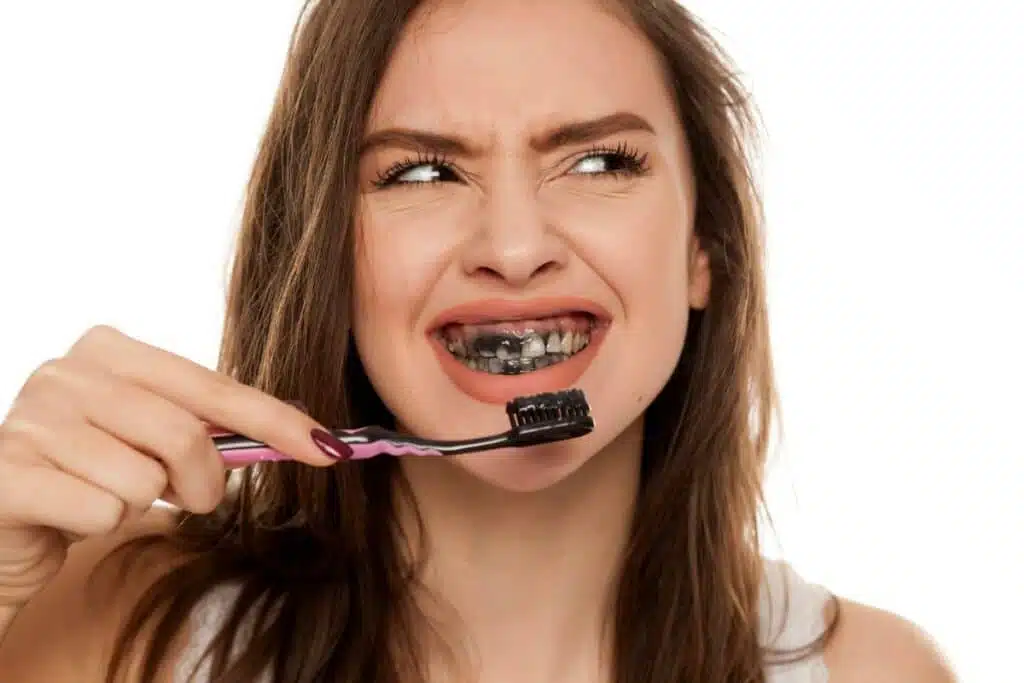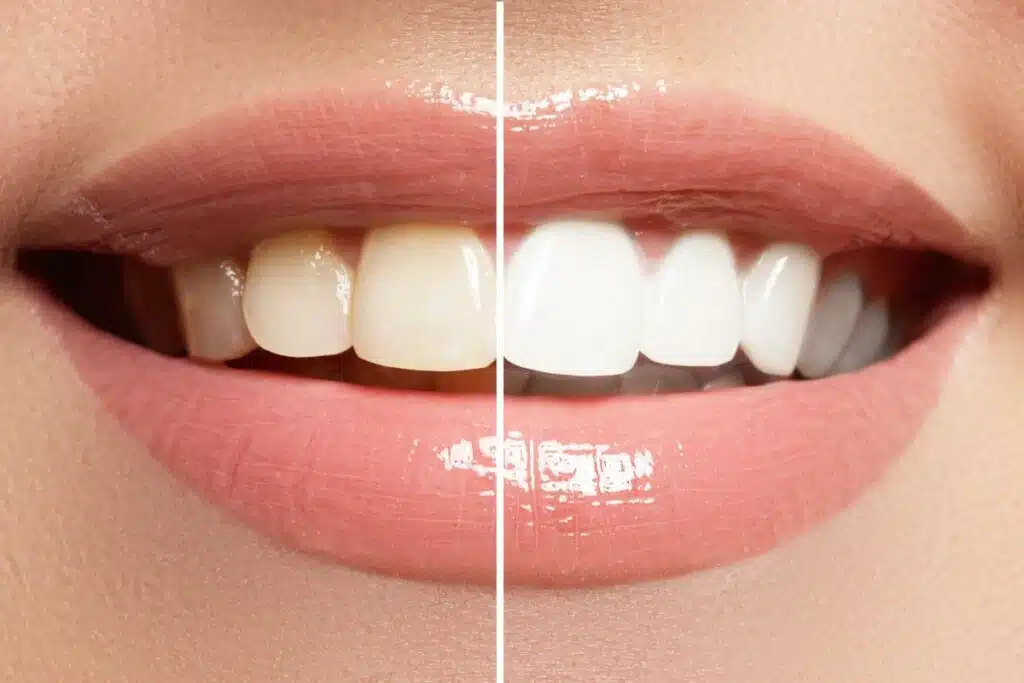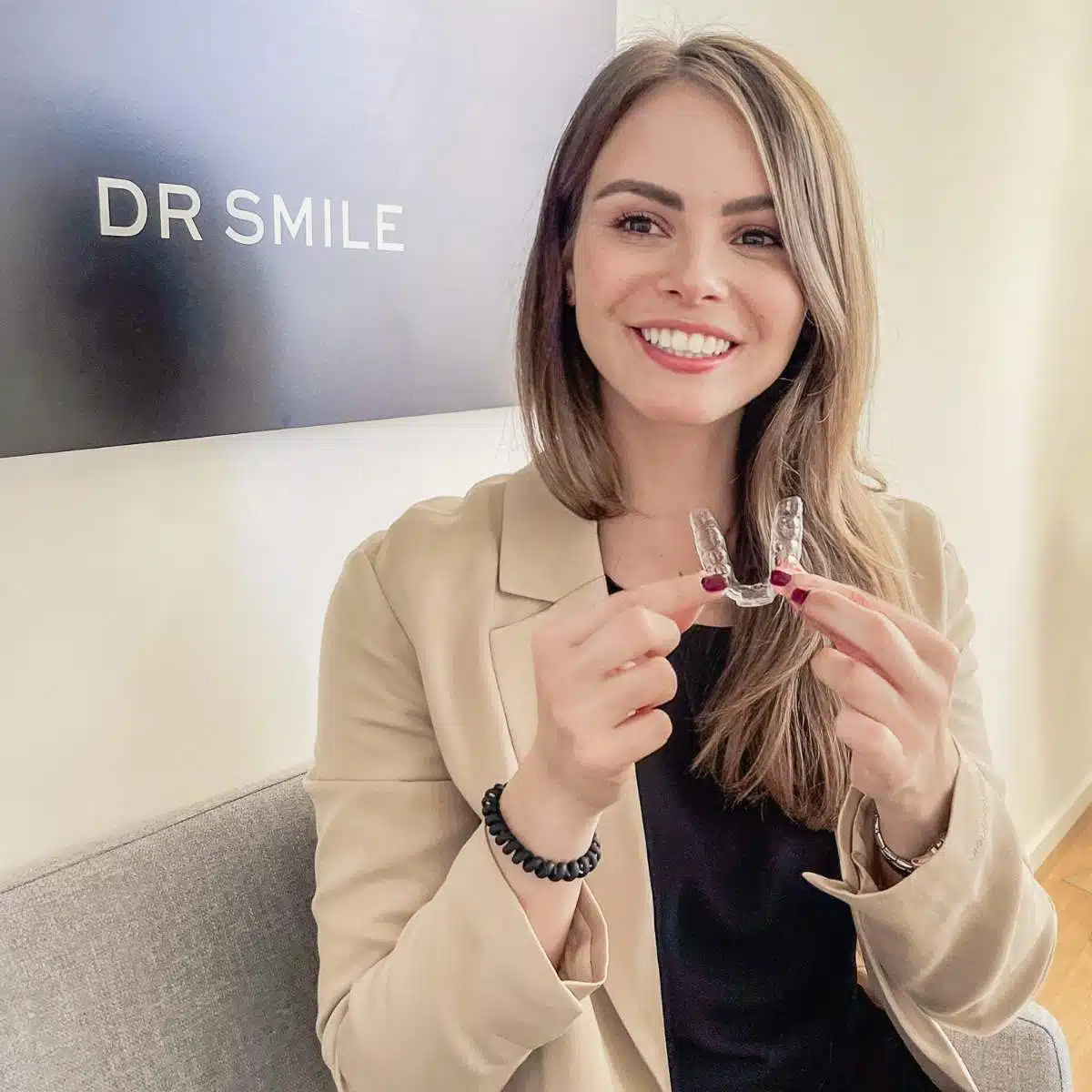Teeth whitening with activated charcoal: Does it really work and which products work best? You can find all the information and tips here.
Teeth whitening with activated charcoal is a trend that has become very popular in recent years.
The idea behind this is that activated charcoal is a natural remedy that can remove discoloration from the teeth and ensure a brighter smile.
But what is really behind this method? In this article, you will find out how activated charcoal works, what products are available and how effective this method actually is.

The effect of activated charcoal in general
Activated carbon is made from organic material that is carbonized at extremely high temperatures, such as wood or coconut shells.
This process creates a fine, porous substance with an extremely large surface area that is able to bind pollutants, toxins and impurities.
This property has long made activated charcoal popular in medicine, especially for detoxification, but also in cosmetics and dental care.
When you use activated charcoal, it works through what is known as the adsorption process. This means that harmful substances, chemicals or even bacteria adhere to the surface of the carbon and are then removed when rinsed or washed out.
In tooth whitening, this effect is used to remove discoloration on the teeth caused by the consumption of coffee, tea, red wine or tobacco.
Tooth whitening products with activated charcoal
There are a variety of products that use activated charcoal to whiten teeth. Here is an overview of the most common options:
1. activated charcoal toothpaste
These products often contain activated charcoal as the main ingredient, combined with other ingredients such as fluoride or calcium, which benefit dental health.
The application is simple: you brush your teeth as usual with toothpaste and the activated charcoal removes discoloration.
These toothpastes usually promise gentle whitening of the teeth without attacking the enamel.
2. activated carbon powder
This is pure activated charcoal powder that is either applied directly to the toothbrush or mixed with water.
This powder is said to be particularly effective as it is used in concentrated form. However, the coarse structure of the powder can wear away tooth enamel if it is used too often or too intensively.

3. activated charcoal tooth whitening strips
These strips contain a mixture of activated charcoal and other active ingredients that support whitening.
They are placed on the teeth and are intended to work for a certain period of time. This method is comparatively easy to use and is often used for more intensive whitening.
4. activated charcoal capsules
An alternative method is the use of activated charcoal capsules, which are broken open and the contents applied to the teeth.
This is basically similar to activated charcoal powder, except that the dosage is already specified in the capsules.
5. toothbrushes with activated charcoal
Toothbrushes with activated charcoal are becoming increasingly popular and are another way of integrating activated charcoal into your daily dental care routine.
These toothbrushes have bristles that are enriched with activated charcoal. The bristles are designed to help remove discoloration and gently whiten teeth. They also have an antibacterial effect and ensure thorough cleaning.
The advantage of these toothbrushes is that you can use them like a normal toothbrush without having to apply additional activated charcoal products.
They are a simple addition to your daily care routine and can be used together with conventional toothpaste.
Effectiveness of activated charcoal for teeth whitening
The question that concerns many: How effective is activated charcoal really at whitening teeth? While many users report visible results after just a few applications, there are some important aspects that you should be aware of:
- Superficial discoloration: Activated charcoal can indeed remove discoloration caused by external influences such as coffee, tea or nicotine. These stains are often found on the tooth surface and the charcoal can remove them through its abrasive effect.
- Deeper discoloration: Activated charcoal is less effective for deeper discolorations, such as those caused by natural aging or certain medications. Such discolorations lie beneath the tooth enamel and can only be treated with professional teeth whitening procedures in a dental practice.
- Enamel damage: Although activated charcoal is sold in toothpastes and powder formulations for regular use, there are concerns that the abrasive action of charcoal could wear away tooth enamel. Too frequent use or using products that are too coarse could cause long-term damage to teeth. It is therefore recommended not to use activated charcoal as a daily tooth cleaning product, but only occasionally.
- Long-term effect: The results of teeth whitening with activated charcoal are often not as permanent as with professional teeth whitening procedures. Regular consumption of coloring substances such as coffee or red wine can quickly discolor the teeth again after use, which is why continuous use may be necessary.

Conclusion on teeth whitening with activated charcoal
For many of you, teeth whitening with activated charcoal can be a natural and uncomplicated way to reduce superficial discoloration and freshen up your smile.
Products such as activated charcoal toothpastes, powders and toothbrushes with activated charcoal are readily available and easy to use.
However, you should be careful not to use them too often or too intensively in order to protect the enamel.
However, for deeper discoloration or longer-lasting whitening, you should consider professional teeth whitening treatments.
In the end, it is important to pay attention to your own dental health and choose the method that best suits your needs.
We take a closer look at more home remedies for whitening teeth here.
FAQs on teeth whitening with activated charcoal
Finally, we will answer some frequently asked questions about teeth whitening with activated charcoal.
How does activated charcoal work for teeth whitening?
Activated charcoal works by adsorption, which means that it binds particles such as plaque and stains to its surface. When applied to the teeth, activated charcoal can therefore help to remove superficial discoloration caused by coffee, tea or tobacco and whiten the teeth.
Is activated charcoal safe for daily use?
Activated charcoal can be abrasive, which means that it can damage tooth enamel if used too frequently or intensively. Dentists recommend using activated charcoal only occasionally and not as daily dental care to protect tooth enamel.
How often should you use activated charcoal for teeth whitening?
It is recommended to use activated charcoal only once or twice a week. More frequent use could damage the tooth enamel and make the teeth more sensitive.
What products are available for teeth whitening with activated charcoal?
There are various products that contain activated charcoal, including toothpastes, powders, whitening strips and toothbrushes with activated charcoal bristles. Each of these variants has a slightly different application, but all aim to reduce discoloration.
Can activated charcoal also remove deeper discoloration?
No, activated charcoal is mainly effective for superficial discoloration caused by external factors such as food and drink. Deeper discoloration, which lies under the enamel, can only be treated by professional teeth whitening methods.
Are toothbrushes with activated charcoal bristles effective?
Toothbrushes with activated charcoal bristles can offer an additional way to reduce slight discoloration. However, their effect is generally not as intensive as that of toothpaste or powder containing activated charcoal directly.
Can activated charcoal cause tooth damage?
If activated charcoal is used too often or too much, it can be abrasive and wear away tooth enamel, which can lead to sensitive teeth and a higher risk of tooth decay. It is therefore important not to overdo this method.
How long does it take to see results with activated charcoal?
The results of teeth whitening with activated charcoal vary, but many users report that they see initial improvements after a few weeks. This also depends on the frequency of use and the degree of discoloration.
Is activated charcoal a natural alternative to other teeth whitening methods?
Yes, activated charcoal is considered a natural alternative to chemical bleaching agents found in many commercial teeth whitening products. Many people prefer this method because they want to avoid synthetic ingredients.
Should I use activated charcoal before or after brushing my teeth?
It is recommended to use activated charcoal before brushing your teeth normally. This can remove discoloration and then you can protect your teeth from tooth decay with a fluoride toothpaste.



Leave a Reply